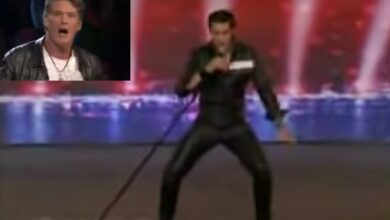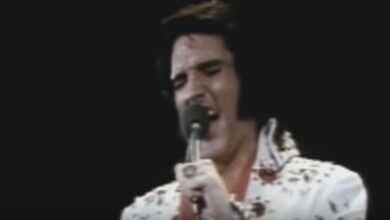He Never Lost That Incredible Voice—A True Masterpiece—We Love Elvis And Everything He Stands For—The Greatest Voice Ever!
Elvis Presley’s rendition of “And I Love You So,” recorded in 1975 at RCA’s Hollywood Studio, is a testament to his profound ability to infuse emotion into his performances. The song, written by Don McLean, is a deeply romantic ballad that resonates with heartfelt sentiment, and Elvis’s version of it is particularly memorable for its expressive depth. As he performed this song during his final concert tours, he demonstrated a remarkable capacity to connect with audiences on an emotional level, showcasing his mastery of vocal expression and emotional delivery.
The recording sessions for “And I Love You So” were part of the sessions for the album “Today,” an effort that aimed to recapture some of the vitality and spirit that characterized Elvis’s earlier work. Although the album had mixed reviews, the track itself stood out due to Elvis’s heartfelt rendition. His interpretation of the song was marked by a tender and sincere approach, highlighting the nuances of the lyrics and the emotional weight of the composition.
Elvis’s live performances of “And I Love You So,” particularly during his 1977 concert tour, were imbued with a raw, emotional intensity that captivated audiences. Despite the physical and personal challenges he faced in his later years, his ability to deliver such a poignant performance spoke volumes about his enduring talent and dedication to his craft. His voice, though showing signs of wear, carried a depth of emotion that made each performance of the song a moving experience for those fortunate enough to witness it.
The connection Elvis established with his audience during these performances was a testament to his exceptional skill as an entertainer. His charisma and stage presence were complemented by a genuine emotional engagement with the material, allowing him to convey the song’s message with authenticity. The vulnerability and introspection he brought to “And I Love You So” resonated deeply with listeners, further cementing his reputation as one of the greatest performers of his time.
Elvis Presley, born on January 8, 1935, in Tupelo, Mississippi, rose to prominence in the 1950s with his unique fusion of rock, country, and rhythm and blues. Known as the “King of Rock and Roll,” Elvis’s influence on music and popular culture is profound. His career was marked by numerous hit records, groundbreaking performances, and a dynamic stage presence that captivated audiences worldwide. Even as his health declined in the later years of his life, his commitment to performing and connecting with his fans never wavered.
His rendition of “And I Love You So” stands as a powerful example of his ability to convey deep emotion through his music. The song’s reflective and intimate nature allowed Elvis to showcase a more vulnerable side of himself, adding a layer of personal connection to his already impressive musical repertoire. This performance, along with many others from his later years, serves as a poignant reminder of his enduring artistry and the emotional power of his voice.
Despite his passing in 1977, Elvis’s music continues to resonate with fans across generations. Recordings and video clips of his performances are widely available, providing new and old fans alike with the opportunity to experience the timeless appeal of his artistry. His legacy as an iconic performer remains strong, and his ability to touch hearts through his music endures, ensuring that his contributions to the world of entertainment are celebrated and remembered.
Elvis Presley’s career, marked by both incredible successes and personal struggles, is a testament to his remarkable talent and resilience. His version of “And I Love You So” exemplifies his ability to connect deeply with his audience and convey genuine emotion through his music. As fans continue to explore his extensive body of work, the impact of his performances remains as profound as ever, cementing his status as one of the most influential and beloved entertainers in history.



